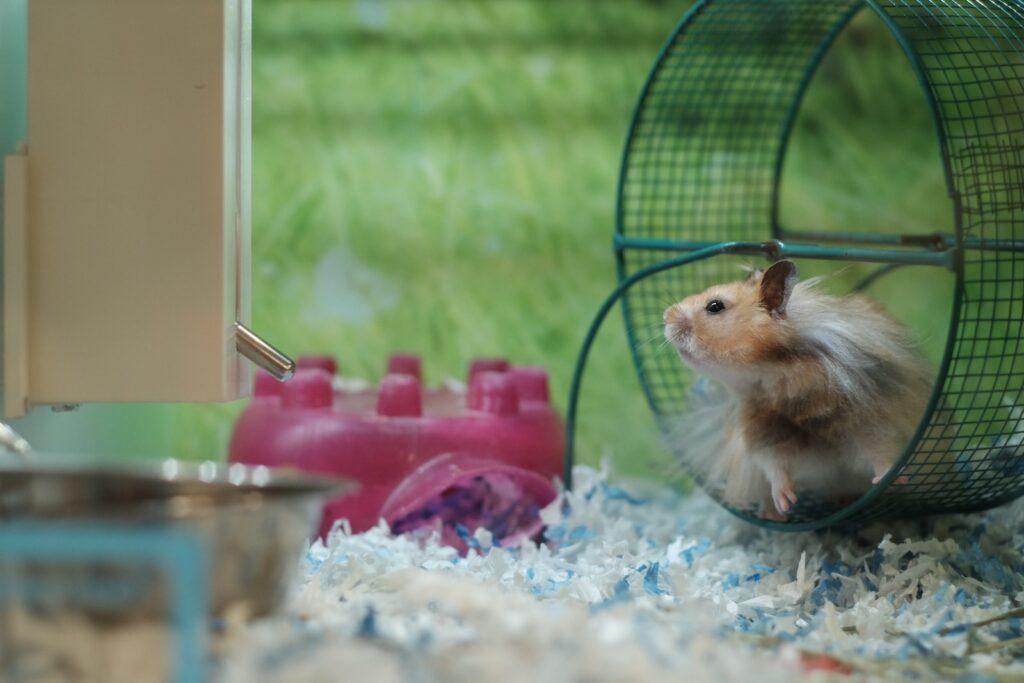Setting up a haven for your gerbil buddies? Delightful! Gerbils are not just adorable, they’re comedians in tiny fur coats. But before you get lost in those innocent eyes, let’s dive into building a safe gerbil mansion!
Understanding Gerbil Requirements
Our tiny furballs have unique needs. It’s not just about cages and bedding. To truly provide a nurturing environment for these active and sociable creatures, we must delve into understanding their specific requirements and natural behaviors.
- Their Nature: Originating from arid desert environments, gerbils have evolved to thrive in low humidity conditions. This means, unlike some pets, they don’t need or appreciate water-based play areas. In fact, excess moisture can be detrimental to their health. So, even though they might look like they’d enjoy a quick dip, it’s best to skip the swimming sessions.
- Exercise Needs: Don’t be fooled by their diminutive size! Gerbils are bundles of energy. Their curious and active nature drives them to run, explore, jump, and dig tunnels. This not only keeps them fit but also mentally stimulated. Regular exercise is essential for preventing obesity and ensuring overall well-being.
- Social Creatures: Gerbils are inherently social. In the wild, they live in family groups and enjoy the company of their peers. When in captivity, a solo gerbil can become lonely and depressed. Hence, having a companion or two can help in keeping them happy and lively. However, it’s crucial to introduce new gerbils to each other slowly and carefully to ensure they get along.
- Chewing Habits: This behavior isn’t just a pastime for gerbils; it’s a necessity. They have continuously growing teeth that need regular wearing down. Without appropriate chewing materials, their teeth can become overgrown, leading to health issues. But here’s the kicker: gerbils aren’t always discerning about what they chew. This means potential risks if they get their paws on unsuitable materials.
Choosing the Right Cage
The gerbil’s fortress! A cage is more than just an enclosure; it’s their home. And just as we’d want our homes to be safe, spacious, and comfortable, gerbils too deserve the best.
- Size Matters: Imagine being a marathon enthusiast stuck in a tiny room. Not pleasant, right? That’s how a gerbil would feel in a cramped cage. A spacious environment ensures they have ample room to move, exercise, and play. It’s especially vital if you’re housing multiple gerbils.
- Material: Wood might look aesthetically pleasing, but given a gerbil’s penchant for chewing, it’s not the most practical choice. Instead, opt for sturdy metal or thick plastic cages. They’re not only durable but also easier to clean.
- Security: Gerbils are curious and can be quite the escape artists if given a chance. Hence, a secure locking mechanism is paramount. Additionally, the spacing between bars should be narrow enough to prevent any adventurous escape attempts.
- Ventilation: Good airflow is crucial to prevent the buildup of ammonia from urine and to ensure a healthy environment. However, it’s equally important to place the cage in a location free from drafts, as gerbils are sensitive to sudden temperature changes.
Perfect Bedding
Imagine settling into a comfy bed after a long day. That’s what the right bedding feels like for your gerbil. It’s more than just a soft place to rest; it’s where they dig, play, and nest.
- Depth: To satisfy their natural tunneling instincts, gerbils require a significant depth of bedding. Aim for 6–8 inches, if not more. This allows them to burrow, create intricate tunnel systems, and enjoy their underground adventures to the fullest.
- Material: When it comes to bedding, not all materials are created equal. Soft paper or aspen shavings are excellent choices. They are absorbent, dust-free, and safe for gerbils. Conversely, pine or cedar shavings, though popular, are not recommended. The aromatic oils in these woods can irritate the gerbil’s respiratory system, making it akin to sleeping on a bed of nails for them.
- Change Frequency: Hygiene is crucial. Regularly changing the bedding ensures a clean and odor-free environment. Depending on the number of gerbils and the size of the cage, a weekly change is generally recommended. Spot cleaning, or removing soiled areas daily, can also prolong the freshness of the bedding.
- Odor Control: Some bedding materials come with added odor control properties. These can be particularly beneficial if you’re sensitive to smells, ensuring both you and your gerbil have a pleasant living environment. Remember, though, to avoid heavily scented beddings as these can be overpowering for your tiny pals.
Setting Up the Fun Zone
Life in captivity can become monotonous if not enriched with activities and playthings. Hence, creating a fun zone in the cage can significantly enhance your gerbil’s quality of life.
- Exercise Wheel: The quintessential rodent accessory isn’t just for hamsters. A smooth, solid exercise wheel provides gerbils with an excellent outlet for their boundless energy. It’s essential to choose a wheel without rungs or mesh to prevent injuries.
- Tunnels: Tunnels are to gerbils what video games are to humans — endlessly entertaining. You can purchase purpose-made tunnels from pet stores or get creative and craft DIY versions using cardboard tubes.
- Hideouts: Everyone needs a little privacy now and then. Gerbils are no exception. Providing them with hideouts or nesting areas allows them a safe space to retreat, relax, or just have some “me” time.
- Toys: Toys keep gerbils mentally stimulated and engaged. Wooden toys, in particular, serve a dual purpose: they are fun to play with and great for their teeth. Ensure the wood is untreated and safe for pets. Additionally, items like hay balls or untreated wicker toys can be wonderful additions to the fun zone.
Feeding the Right Way
Gerbils are not just playful and energetic; they also have a voracious appetite. And just as with humans, the quality and variety of their diet significantly impact their health and happiness.
- Primary Diet: A balanced diet is paramount. Commercial gerbil foods, available at pet stores, usually comprise a mix of seeds, grains, and pellets, ensuring they get all the essential nutrients. While it might be tempting to offer them treats or human food, these should only be supplementary to their primary food source.
- Treats: Everyone loves a culinary treat once in a while, and gerbils are no exception. Fresh fruits like apples, bananas, and blueberries, along with veggies such as carrots, broccoli, and peas, can be offered occasionally. However, moderation is key. Remember to avoid citrus fruits and anything with a high-water content. And as always, before introducing any new food, ensure it’s safe for gerbil consumption.
- Water: Hydration is vital. Always ensure your gerbil has access to fresh water. Use a hanging water bottle with a metal sipper tube; it’s clean, efficient, and prevents any accidental drowning. Remember, while gerbils might hail from desert regions, they still need constant access to water in captivity.
- Feeding Bowls: Stability in a bowl is crucial. If a gerbil can tip it over, they will. Opt for heavyweight bowls made of metal or ceramic. These materials are not just durable; they are also resistant to the gerbil’s incessant chewing.
Gerbil Health Check
Just as you would for any other family member, ensuring your gerbil’s health should be a top priority. Regular checks, both at home and with a professional, can prevent potential issues or nip them in the bud.
- Regular Observation: Often, the first signs of health issues are subtle behavioral changes. Is your gerbil eating less? Are they less active than usual? Or maybe their coat doesn’t look as shiny? Regular observation can help you spot these red flags early on.
- Veterinary Checks: Just as you would visit a doctor for your annual check-up, ensure your gerbil sees a vet, preferably one specializing in small mammals, at least once a year. They can provide vaccinations, detect any health issues, and offer guidance on diet and care.
- Safe Environment: The cage environment should be free from potential hazards. Ensure there are no harmful plants, foods, or small objects that a gerbil might ingest. A safe space goes a long way in preventing unforeseen health problems.
- Handling: Gerbils are gentle creatures, and when handling them, you should be too. Avoid sudden movements or loud noises that might startle them. And when picking them up, do so gently, ensuring you don’t squeeze or hold them too tight. Remember, trust is earned, and with gentle handling, your gerbil will come to see you as a friend.
Conclusion
As the curtains draw to a close on our gerbil care guide, one thing remains abundantly clear: these little creatures, with their inquisitive eyes and bustling personalities, are more than just pets. They become integral members of our families, offering joy, laughter, and unending companionship. Ensuring their well-being, understanding their unique requirements, and showering them with affection is the least we can do for the endless joy they bring into our lives.
FAQs
- Q: How often should I clean the gerbil cage?
- A: Maintaining cleanliness is pivotal for your gerbil’s health. Aim to clean the cage once a week. This not only ensures a hygienic environment but also prevents the build-up of harmful ammonia from urine. Remember to replace the bedding and remove any uneaten food during each cleaning.
- Q: Can I keep gerbils with other pets?
- A: This is a tricky one. While gerbils are social animals, they might not always get along with other species. Cats and dogs, for instance, might see them as prey, leading to stressful or even dangerous situations. If you have other pets, always supervise their interactions with gerbils and ideally keep them in separate spaces.
- Q: Do gerbils need sand baths?
- A: Absolutely! Sand baths are not just a luxury for gerbils; they’re a necessity. The sand helps them clean their fur, removing excess oils and dirt. Make sure to provide a shallow dish filled with chinchilla sand (not dust) for this purpose. You’ll often find them rolling and frolicking in it, a sign of pure gerbil bliss!
- Q: What’s the lifespan of a gerbil?
- A: With proper care, love, and a balanced diet, gerbils typically live between 2 to 4 years. However, some gerbils, when showered with exceptional care, have been known to celebrate their 5th birthdays. It’s a testament to how the right environment and care can positively impact their lifespans.





